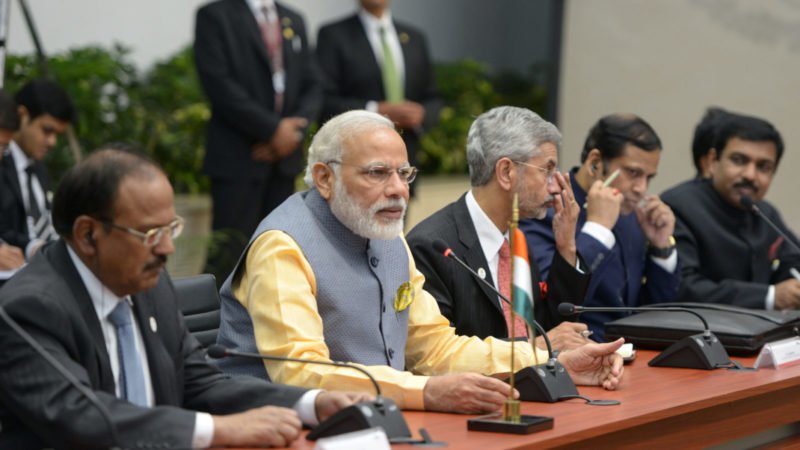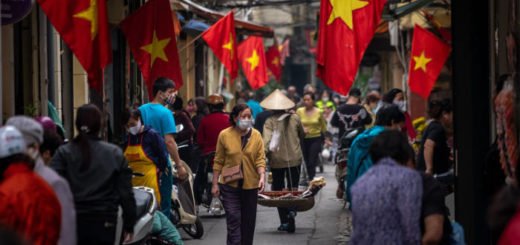Resetting Indian Foreign Policy in the New World Order

With the end of the Cold War, the old framework of India’s foreign policy collapsed and further the disintegration of the Soviet Union in the following year, signified the cessation of existing world order. The formal end of the cold war was announced at Malta by US President George Bush and Soviet President Mikhail Gorbachev in December 1989. The new world order had not really emerged at once but the old world order, created after the end of the Second World War was now no more. It heralded a new era characterised by a highly uncertain world order. The world faced a new situation and so did India. The country had to think afresh and a new.
Basics of India’s Foreign Policy
In the changed circumstances, the Nehru’s framework of staying away from bloc politics, of non-alignment, of the quest for world peace, of the struggle against colonialism and racialism, of the maintenance of the autonomy of judgement, of independent development, of cooperation with all the big powers but subject to the preservation of India’s interests, security and independence, of unity of action to the extent possible of the non-aligned and developing countries, all this was the conceptual framework answering to the objective situation prevailing in cold war period. And new directions were needed for India’s foreign policy.
No doubt, the foreign policy that India formulated, and the international prestige that she rapidly acquired, opened great possibilities for her to obtain concessionary aid from the two competing and opposed blocs that dominated the international system. Undoubtedly, this was a major achievement for India’s economic and political diplomacy, since she was the first developing country to benefit from a cold war situation, obtaining meaningful assistance when the other developing countries, who had allied to one bloc or the other, should have been logically the greater beneficiaries of the bipolar.
Beginning of the New World Order

At the juncture, the world was in transition from the old order that was dead and gone to a new order that was yet struggling to be born. International relations have frequently been marked by contradictory trends, but rarely was this complexity more evident, demanding more careful examination and analysis as today. However, the change must relate to the actual situation, to the prospects opening before the world, to the geopolitical situation faced by the country, not just to distant rumblings in a far off region, and to the deeper undercurrents of international politics of a particular period.
As the old parameters had to be supplemented with new ones, it was felt that in the new situation foreign policy must advance the economic interests of India. The economic imperative, no less than the security imperative, must govern India’s policies. Except in an emergency, like the imminent threat of war, international economic relations must now share the pride of place with the more traditional geopolitical considerations. The regional situation, the threats to India’s security, the nuclearisation around India’s borders, the state-sponsored terrorism from across the frontiers, all these factors must continue to engage India’s concern and prompt India’s vigil.
The basic characteristic of the new international phase is the urge for cooperation, mitigating and eliminating conflicts and enmities, regional economic integration and economic development of each country. We have seen that the regional scenes are not alike and artificial transplantation does not work, but trends in the world today interpenetrate in different parts of the planet much more rapidly than ever before. There is a need to be alive to them and to promote them whenever the opportunity presents itself our way.
Contents of the Policy
In the context, the most significant and really qualitative leap towards the globalisation of India’s economy was taken in 1991 by the then Congress government headed by P.V. Narasimha Rao. The decision to globalise the Indian economy was certainly a defining moment in contemporary Indian history. The 1991 economic reforms saw the birth for a new role for international economic and trade relations. India suddenly had to engage with the post-cold war world and reassess its foreign policy priorities. The opening up of the economy to international players also meant that foreign relations had an economic dimension and trade became a foreign policy tool. Leaving Swadeshi, economic self-sufficiency behind and engaging in international trade was India’s new way forward.
After the Congress lost power the United Front government under Deve Gowda and I. K. Gujral started to focus more on foreign policy and foreign relations. In part, this was due to India coming to term with its first coalition government where consensus on domestic affairs was not always forthcoming. The I.K.Gujral peace moves towards Pakistan were a direct result of this–as were Deve Gowda’s economic interest in South East Asia and the ‘Look East’ policy with a clear vision for India’s North-Eastern states. The ‘Look East’ policy was a part of India’s re-assessment of its role in the wider region, for the first time looking at Southeast Asia as a neighbour which mattered politically and economically. As India was looking for new markets and relations with the US still had not warmed up, a strategic decision to focus on Southeast Asia was taken.
In BJP – led coalition government the vision was one of a multi-polar world in which economic relations were going to be crucial. Regional policy became of prime importance, especially with regard to improving trade and improving the situation in India’s border states. The BJP’s foreign policy priorities have not been that different from that of Congress. The BJP, unlike previous Congress government, also saw that there are direct links between foreign policy formulation and domestic policy, especially in the economic realm. The then government not only continued but intensified the economic reforms after forming their coalition called the National Democratic Alliance (NDA). Their agenda was focused on increased open markets and more trade, internationally as well as regionally.
Simultaneously, a process of introspection was underway in country’s social, economic and political structures, which will redefine a vibrant, dynamic and open India, at ease in its interactions with the world at large. Gradually, India’s foreign policy has assumed a positive outward orientation with new policy initiatives aimed at consolidating traditional relationships, developing new relationships with countries and regions where it has vital strategic interests.
New Policy Imperatives
As a part of this new strategy, relations with the US, Israel and Myanmar were all revived. These were countries India aspired to keep away from for various regions: the US for its imperialistic global bullying strategy, Israel for its war against the Palestinians and Myanmar for its undemocratic government in light of the 1990 elections. The 9/11 war on terror changed relations with the US for good. India saw in this an opportunity to ally itself with the US and portray the Kashmir problem as part of the war on terror. The US was seen as a powerful economic ally holding the purse strings of various international funds. Peace or a dialogue about peace with Pakistan was seen as essential. Peace meant that India would finally be seen as an economically safe region for international investment. The government finally decided to tackle the China factor for the first time. With China increasing as an economic might in the region, India needed to improve relations and increase trade quickly.
India’s relations with the United States has expanded remarkably over the last few years on civil nuclear and other strategic issues. The new agenda laid greater emphasis on economic dimension in foreign policy, on the need to revitalise the Non-aligned Movement and to reform and restructure the UN to better reflect the aspirations of the developing countries. At present, these apart, India attaches the highest importance to developing cordial and friendly relations with her neighbour with a view to promote peace, stability, mutual confidence in the region, and for developing strong economic and commercial relations for all-round prosperity. Adjustments on all these fronts were made during the period of post-cold war.


















